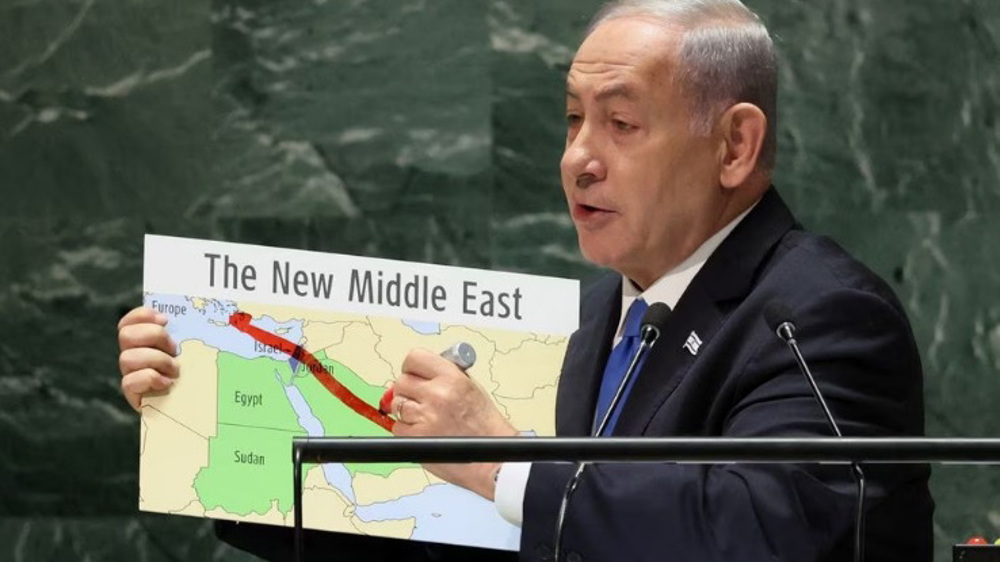
Israeli prime minister Benjamin Netanyahu has asserted that the Tel Aviv regime is “at the cusp” of a historic breakthrough leading to a normalization agreement with Saudi Arabia, as he presented a “new Middle East” map erasing Palestine.
During his roughly 25-minute speech at the 78th session of the United Nations General Assembly in New York on Friday, Netanyahu enthusiastically promoted the reshaping of the region based on establishing ties with Arab countries, especially Saudi Arabia.
The map that the 73-year-old chairman of the Likud party held up made no reference to the Gaza Strip or the West Bank and East al-Quds – the territories that Israel captured in 1967 and Palestinians want for their future state. The map appeared to show the Israeli regime encompassing all three.
The chamber was largely empty during his address, though there was a group of Netanyahu supporters who clapped several times during his speech.
Protesters and supporters of Netanyahu demonstrated across the street from the UN headquarters.
“I believe we can achieve peace with Saudi Arabia with the leadership of President [Joe] Biden,” Netanyahu claimed.
The far-right Israeli prime minister stressed on Friday that Palestinians should not be allowed to veto the regional deal-making.
The use of such maps by Israeli officials comes at a time when Netanyahu’s hardline administration has taken steps that experts say amount to the “de jure annexation” of the occupied West Bank.
Netanyahu’s speech comes a day after Palestinian President Mahmoud Abbas addressed the same forum, saying that peace in the West Asia region is not achievable until Palestinians are granted full rights with statehood.
“Those who think that peace can prevail in the Middle East without the Palestinian people enjoying their full legitimate and national rights would be mistaken,” Abbas said.
Biden declared on July 28 that a deal for Israel and Saudi Arabia to normalize relations may be on the horizon following his national security adviser Jake Sullivan’s talks with Saudi officials in Jeddah.
In order to sign a deal with Israel, Riyadh publicly asked Tel Aviv to implement the 2002 so-called Arab Peace Initiative to establish a Palestinian state first.
However, Israeli officials say they will not make any concession to the Palestinians as part of a potential deal for normalization of relations with Saudi Arabia.
Washington’s efforts for adding Saudi Arabia to the list of Arab countries that have signed the so-called Abraham Accords come at a critical time when Biden is seeking re-election and the US government has been left embarrassed by the kingdom’s bolstering of ties with Iran and Syria, and its further gravitation toward China.
The United Arab Emirates, Bahrain, Sudan, and Morocco signed US-brokered normalization agreements with Israel in 2020, drawing condemnations from Palestinians who slammed the deals as “a stab in the back of the Palestinian cause and the Palestinian people.”





Leave a Reply